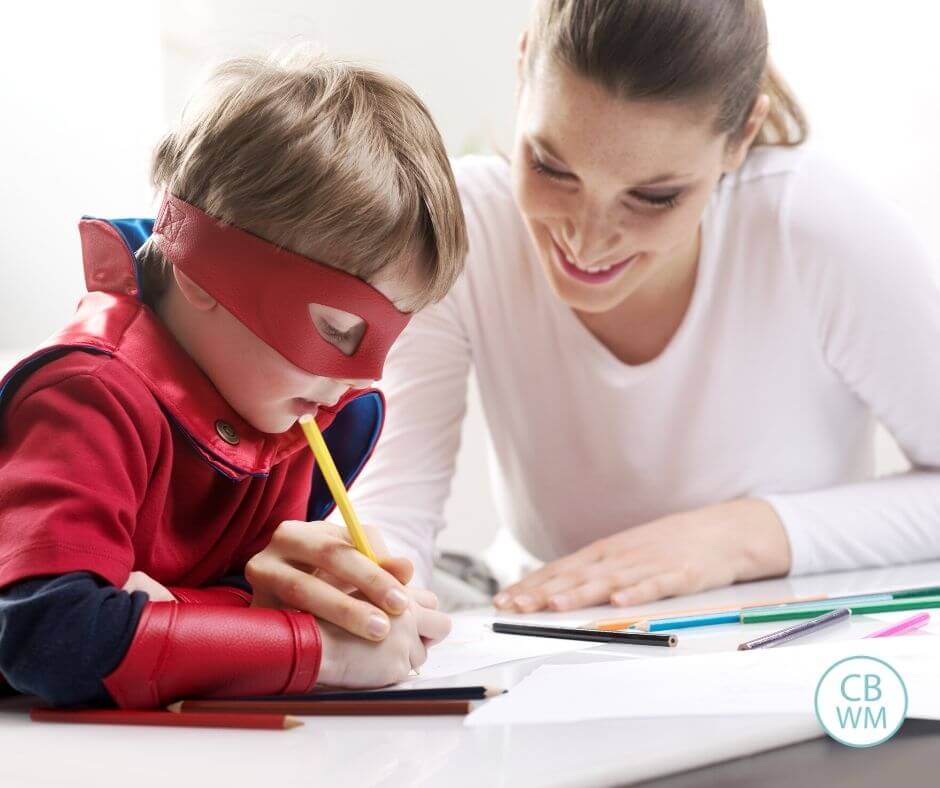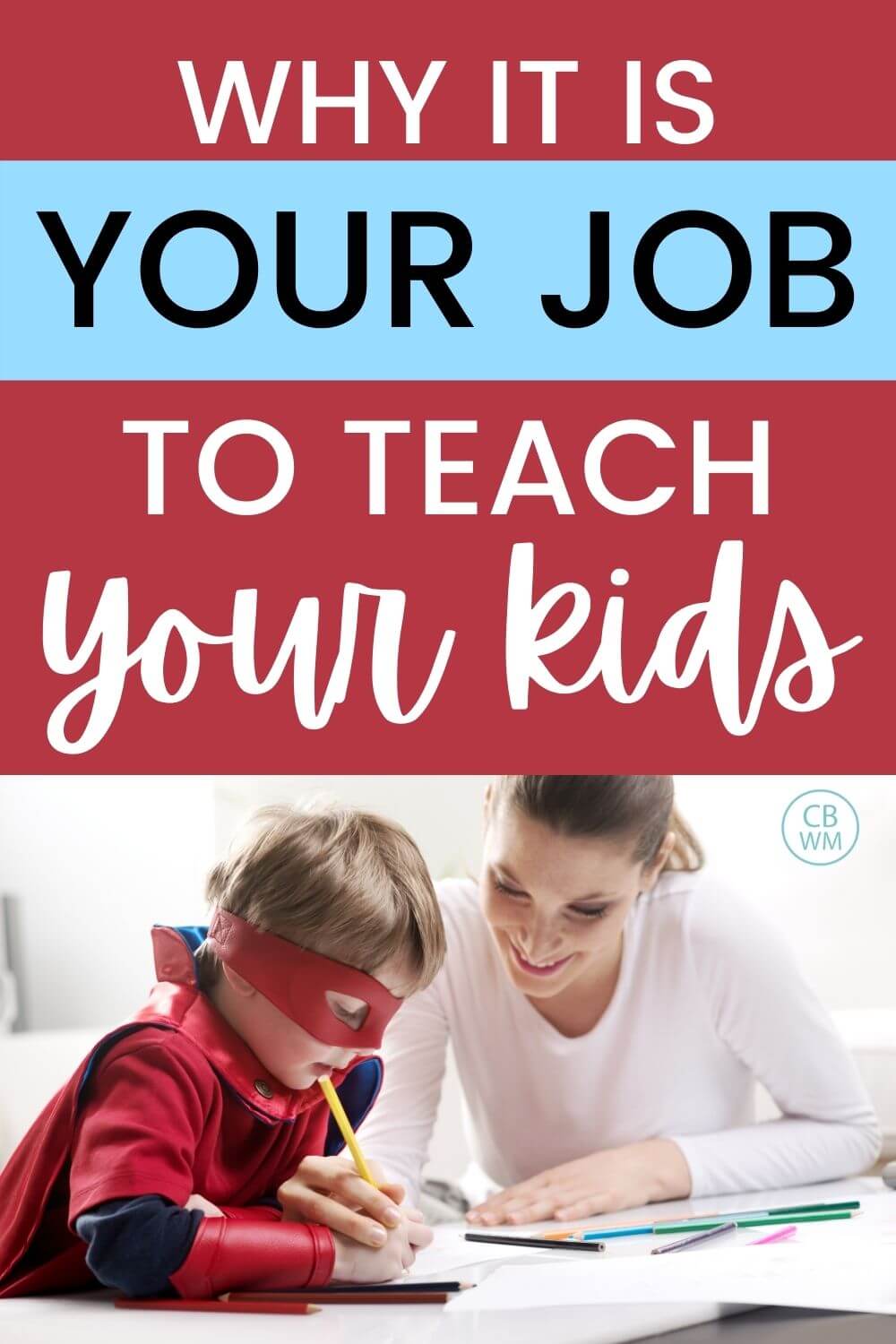While it is tempting to blame others when our kids don’t know something, it is really OUR job to teach OUR kids.

There seems to be a large portion of parents today who are under the impression that it is not their job to teach their children. It might even be a majority. Because I am relatively young, I don’t know if this is a new mentality or one parents have held for hundreds of years. No matter when this mentality came along, it is here now.
And it is wrong.
It is wrong on so many levels. Morally. Academically. Domestically. Religiously. Even athletically.
I can’t think of a situation when the main person in charge of teaching a child should be anyone other than the parent/guardian.
And yet people leave so much in the hands of others. They rely on Primary Sunday School to teach morals and religion.
They rely on teachers to teach academics. They rely on coaches to teach the rules of the game.
And they rely on…well…I guess no one to teach domestic skills.
It Is Your Job to Teach Your Kids
The Read-Aloud Handbook has some excellent arguments for why the parent is the number one teacher in the child’s life–whether he/she likes it or not.
As Trelease points out,
“…a child spends 900 hours a year in school and 7,800 hours outside of school. Which teacher has the bigger influence? Where is more time available for change?”.
(page xv)
If you see your child needs help in any area, you are the one who can best make a change. Even if that is not an area you excel at.
This in no way takes away from the powerful impact and influence teachers and coaches can have on our kids. They are an invaluable part of the equation.
But they are not the entire equation.
And they are not to blame.
My neighbor was a huge sports star growing up. He still loves to play sports and is quite athletic.
Given the “standard” in today’s society, I was surprised that he and his wife didn’t put their children in organized sports until they were much older. I thought that given his value on sports, he would want his boys started as early as possible so they could build their skills.
But do you know what he says? He says the best way for a boy to learn to play baseball is not by putting him in T-ball, but by playing catch with him in the backyard.
The Read Aloud Handbook is of course concerned with education, and specifically reading. It is full of interesting studies and statistics that prove home is where knowledge is taught, and especially a love of reading. “…research shows that the seeds of reading and school success are sown in the home, long before the child ever arrives at school” (page xv).
Your child’s success depends on you.
You are the key. And if you feel unequal to the task, the Read Aloud Handbook is full of inspiring stories, including stories of parents with little to no education producing children who grew to be Pulitzer Prize winners and doctors and more…all with nothing more than their involvement.
These mothers couldn’t even read themselves. It can be done.
I read this book for the first time shortly before Brayden had started Kindergarten. I loved it and thought it all sounded great.
Once Brayden was in Kindergarten and started going to school, I was able to witness first-hand the stark truth to what Trelease had to say. Of course I believed what he had said, but it never hits home fully until you witness it.
I help in Brayden’s class several times a week. I am amazed at the difference in abilities among the children.
There are literally children in the class that Kaitlyn (age 3) could out-perform. I sat in my ignorance wondering why.
As I visited with Brayden’s teacher, who has been teaching for a long time, she told me the difference is in parental involvement. She shared that she will call parents daily to tell them what to work on at home with their children and she sees no improvement in the child. She can tell who gets the mental stimulation at home and who doesn’t.
I have never felt like what I did with my children at home was huge or earth shattering. In fact, I often feel like it is inadequate and not as much as I could do. I am sure most moms feel the same way.
One day, a couple of years ago, I was visiting with one of my best friends who has a degree in Early Childhood Education (holla Lisa!).
I told her my kids were just naturally smart because I hadn’t done much to teach them. She told me I was very wrong. She listed off the things I have done to teach them what they know. Honestly, they are all basic things I think every parent does, but sadly, they don’t.
It really is simple. The Read Aloud Handbook can give you great information on how to accomplish this.
But know that by simple I don’t mean “10 minutes a day” or something. This is no gimmick.
Parenting takes time. That is what it is. But it is not hard. It doesn’t require a special degree. And no one can do it better than you can. You are the parent for a reason. So take courage and tap into those hours at home to teach your child!
RELATED POSTS
- Why The Read-Aloud Handbook is a Must-Read
- How To Improve Reading Skills with Sustained Silent Reading
- How To Be an Authoritative Parent

